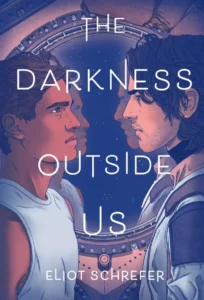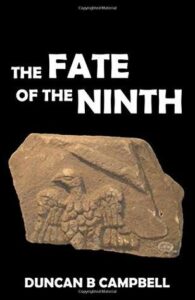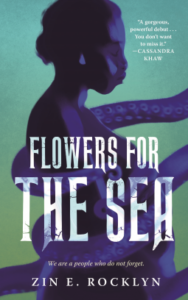Posted January 9, 2022 by Nicky in Reviews / 0 Comments
 Strange Beasts of China, Yan Ge, trans. Jeremy Tiang
Strange Beasts of China, Yan Ge, trans. Jeremy Tiang
I was intrigued by the sound of this book when I read that it was based on a bestiary. In a way, I can see why that’s the description — the opening paragraph and closing paragraph of each chapter sound like that, though mostly it sounds like a series of articles/stories (which is actually what the frame story is: the narrator is a novelist, researching and writing stories about beasts for a column). I was also intrigued by the mention of the main character being a zoologist… but she’s mostly a novelist, and the book doesn’t really have much of a scientific outlook toward the beasts and their stories.
I’m kind of torn on what to think about it and how to rate it, honestly. I feel like I might’ve enjoyed it more if I’d had more of a sense of what it would really be like — though I also felt like it was needlessly opaque sometimes, like I’d need a diagram to understand exactly how everything was related and why the outcomes were the way they were. I don’t know if that was the translation (the “opaque” feeling is something I get with work in translation sometimes), the story itself, or me being slow-witted today, but it just didn’t quite come together for me.
I guess the final bit also felt a bit heavy-handed, like… the stuff that I didn’t need to be spelled out to me about the themes was, while I was still mentally drawing diagrams about how the different characters were related!
All that said, it was an interesting experience — one of the early comparisons to come to my mind was Ursula Le Guin’s Changing Planes; there’s something of the same tone and intent there, I think, the same consciousness that a point is being made. I loved Changing Planes, so that’s not a diss on this book, it’s just that it didn’t quite work for me here.
Rating: 2/5
Tags: book reviews. Yan Ge, books, SF/F
Posted January 7, 2022 by Nicky in Reviews / 0 Comments
 The Darkness Outside Us, Eliot Schrefer
The Darkness Outside Us, Eliot Schrefer
This is a very claustrophobic book, with a very tight group of characters. In the “present” of the book, there are three: the operating system running the ship, the spacefarer from Federation, and the spacefarer from Demokratia. There are some glimpses of other characters in the past, but the action takes place on a spaceship, with just those three, stuck together.
It’s a book that I think most people would prefer to read blind, so I’m not going to say too much — most of my comments about the book as a whole would give too much away. I will say, though, that I expected it to be more about the romance and less about the sci-fi/mystery, and instead I’d say that the sci-fi/mystery is the primary thread, with the romance… not quite taken for granted, but definitely not the primary story being told here.
I found it really readable, and actually finished big chunks at a time, though some of the tense bits triggered my anxiety for a bit and I had to put it down. There were things I found predictable, but I was curious about less the “what” or even “why” than the “how”. That paid off for me, especially from part two onwards; in part one I was kinda wondering if I’d stick with it because of that.
Rating: 4/5
Tags: book reviews, books, Eliot Schrefer, mystery, queer fic, romance, SF/F
Posted January 5, 2022 by Nicky in General / 0 Comments
Hey everyone! It’s been a while since I did this… but I missed it, I was just too tired out by life to pop in and say hi. So, how’s the reading going? Here’re my answers:
 What are you currently reading?
What are you currently reading?
Fiction: a reread of The Dark is Rising, which just missed being perfectly seasonal, and which I’m almost done with, and Eliot Schrefer’s The Darkness Outside Us. The latter’s a little predictable, but I’m curious exactly how they’ll work it all out, and also about the romance.
Non-fiction: I’m reading Chris Gosden’s A History of Magic, but I’m constantly full of objections about the assumptions made about things we can’t possibly know. Like, people don’t need to be exploring a deep spiritual bond with animals to draw them: I do not have a deep spiritual bond with cats. I don’t even particularly like cats, I just have a particular stylised cat doodle I like to do and then label “Jorts”. And people don’t need to be trying to borrow the magic of animals to tattoo said animal onto their skin: few people are actually trying to do a magical spell when they tattoo Belle from Beauty and the Beast on their arm (though if it works to summon that library, I’ll do it). I find the descriptions of the archaeology fascinating, though.
What have you recently finished reading?
Nothing yet in 2022! But I did read quite a bit between Christmas and the New Year, including Murder After Christmas by Rupert Lattimer. It went on slightly too long and tried too hard to be quirky, but it was fun in its way.
 What will you read next?
What will you read next?
I don’t know. Possibly Serena Dyer’s Material Lives, which is about (as per the subtitle) “Women Makers and Consumer Culture in the 18th Century”, which I’m quite curious about. Also, I should read Yan Ge’s Strange Beasts of China, since it’s a book club read.
How about you?
Tags: books, Chris Gosden, Eliot Schrefer, Rupert Lattimer, Serena Dyer, Susan Cooper, WWW Wednesday
Posted December 31, 2021 by Nicky in Reviews / 0 Comments
 Crime at Christmas, C.H.B. Kitchin
Crime at Christmas, C.H.B. Kitchin
I got this book from my advent “calendar” and thought, well, I’d better crack on with this one since it’s seasonal! Again, an author I knew nothing about before, though this one is set in Britain. The narrator is a rather neurotic young man who has had a previous brush with the police after the murder of his aunt, and who is consequently rather overset when he finds a dead body on Christmas morning, and then another a day later. Well, you can’t blame him, exactly, but his narration is rather waffly, and he’s rather self-absorbed.
There is some rather good stuff here, all the same, with a character who manages to be both sympathetic and sinister. The ramblings of the narrator start to make the plot clear once both corpses are finally on screen (so to speak), and it trundles along to a dramatic conclusion with a final traditional exposition by the detective, followed by a confession and a final dramatic moment…
Unfortunately it doesn’t stop there but then has a really weird coda, with a dialogue involving the reader and the main character. It’s more than a bit odd.
Anyway, the plot isn’t too unusual or sensationally surprising in a crime novel of the period, with of course a weird privileged position for the narrator in the detective’s investigation that makes no real sense (although the detective has the sense not to trust him too far and has his calls tapped — good call). I read it in a day, so though I sound lukewarm, for someone who’s interested in reading crime fiction of that period it’s an interesting one.
Rating: 3/5
Tags: book reviews, books, C.H.B. Kitchin, crime, mystery
Posted December 31, 2021 by Nicky in Reviews / 0 Comments
 The Darkening Age, Catherine Nixey
The Darkening Age, Catherine Nixey
The Darkening Age is a very readable book about a very depressing subject: the loss of knowledge, art and culture from the classical world when Christianity became mainstream. You often hear people saying that Christian monasteries preserved classical knowledge and literature, and it’s true — there are manuscripts which only survived because they were held in monasteries.
Unfortunately, as Catherine Nixey discusses at length, much more was destroyed by Christianity. Deliberately, purposefully, and with malice. Temples were torn down, books burned, inscriptions destroyed, etc, etc. If Christianity had truly been such a preserving force, we’d have a lot more than we do now, perhaps. Nixey goes through it step by step, the initial period of co-existence (and the fact that evidence suggests Christians were not persecuted nearly as much as they liked to think they were) and then the ramping up of hostilities, the sanctioned-and-encouraged utter destruction of “pagan” idols and temples, etc.
For such a heavy subject, it really is a very readable book, and I pretty much tore through it. It gets perhaps a bit repetitive, and other reviews are right to point out that there were other causes of the loss of texts, destructions of temples, etc.
The author is a journalist, rather than a historian, and the text is pretty much uninterrupted by footnotes/sourcing, so definitely be aware that it’s very much a popular history, and flavoured by opinion, rather than being an academic work. I found it an absorbing read!
Rating: 4/5
Tags: book reviews, books, Catherine Nixey, history, non-fiction
Posted December 31, 2021 by Nicky in Reviews / 0 Comments
 Murder After Christmas, Rupert Lattimer
Murder After Christmas, Rupert Lattimer
You know, I don’t really know what to make of this one. There is something energetic and compelling about it, and yet I also wanted it to just get to the point already! I think it makes itself feel more convoluted because of the various different comic turns various different characters do, and that makes it both lively and frustrating.
The plot hinges on who had a motive for an old man to die after Christmas, when everything seems to point to the fact that it would really have been more convenient for most suspects if he’d died before Christmas. Despite the inquest bringing in a verdict of accidental death, nobody’s quite satisfied because of all the weird coincidences and red herrings… and it takes an unconscionably long time to get everything sorted out because everyone’s flinging out more red herrings with every word.
I feel like the comic speeches lost their amusement value after a while; there are some really fun character sketches, but in the end it’s just too convoluted (and we spend too much time hearing from the detectives about how convoluted it is — scenes which seem to be intended to help the reader keep things straight, but which definitely kill the pace). So… fun, but outstayed its welcome.
Rating: 3/5
Tags: book reviews, books, British Library Crime Classics, crime, mystery, Rupert Lattimer
Posted December 30, 2021 by Nicky in Reviews / 0 Comments
 Dead Dead Girls, Nekesa Afia
Dead Dead Girls, Nekesa Afia
Dead Dead Girls is a mystery story set in 1920s Harlem, in which a young black girl who previously freed herself from a kidnapping gets arrested for attacking a police officer while drunk, and offered freedom if she’ll help them solve a murder. I found it difficult to go along with that as a plot point, especially with the detectives treating her like a valued consultant half the time, but the story rolls along pacily enough.
Maybe too pacily, to be honest: there were a few events that should’ve been more affecting than they were, and things I ought to have cared about as a reader, but it felt like everything ticked past too smoothly for me to feel it — and it doesn’t help that there’s something quite simple and matter-of-fact about the narration. It’s a style that works for me sometimes, but didn’t here, and it led to things feeling choppy, disjointed, and sometimes just incongruous. One particular character starts out as an asshole and then… I don’t really understand why he does what he does toward the end of the book.
It’s not a bad read, but it didn’t work for me and it’s not something I feel super-tempted to come back to.
Rating: 2/5
Tags: book reviews, books, crime, mystery, Nekesa Afia
Posted December 29, 2021 by Nicky in Reviews / 0 Comments
 The Fate of the Ninth, Duncan B. Campbell
The Fate of the Ninth, Duncan B. Campbell
I’ve always been fascinated by the Ninth Legion, at least ever since I can remember, because of Rosemary Sutcliff’s The Eagle of the Ninth (a story that I’m pretty sure was told to me until I could read it myself, though my mother liked Warrior Scarlet best). This is obviously less thrilling, since it’s non-fiction, and there’s a lot of detail about how the Roman army worked, etc… more than I could remember in one go, really: in some ways, I kinda just took the author’s word for it about the minutiae.
It did make me sad to learn from this book that the origin story of The Eagle of the Ninth is based on a wrong interpretation of an archaeological find– the eagle found in Silchester was more likely decorative, perhaps on a fort, rather than being the eagle of a legion.
Despite destroying the basis of a favourite book, I did enjoy this. It pieces together the story of the IX Hispana through the textual records they left behind — their stamps on tiles, the name of the legion on commemorative stones that discuss the careers of various Roman consuls and other officials — rather than through more exciting archaeology. If you’re not super interested in how Roman inscriptions can help date historical events, or the IX Hispana legion, it might not be of much interest, though! It’s a little dry for that.
Rating: 3/5
Tags: book reviews, books, Duncan B. Campbell, history, non-fiction
Posted December 29, 2021 by Nicky in Reviews / 0 Comments
 A Psalm for the Wild-Built, Becky Chambers
A Psalm for the Wild-Built, Becky Chambers
Received to review via Netgalley
I was surprised to find that A Psalm for the Wild-Built didn’t get under my skin the way every other book of Chambers’ has: I enjoyed it, and enjoyed the discussion of figuring out your purpose (and whether that’s important or not). I enjoyed the idea of Dex’s work as a tea monk, helping people relax and unburden themselves — and I totally sympathised with the fact that Dex learned a whole profession, got good at it, and then found themselves wanting to start over and learn anew. All the same, it didn’t quite get the emotional reaction from me that I expected.
The world Chambers builds here is interesting too: utopian, and yet not without people who are dissatisfied, people who don’t know what to do with themselves, the everyday hurts and troubles that are going to be inevitable amongst people. As ever, there’s something profoundly hopeful about this story.
The robots are perhaps the most interesting part, and I’ll look forward to reading more about Mosscap and its opinions about humanity, as it begins to journey and meet people and ask questions. The story feels complete and satisfying on its own, in a way, but I won’t argue with getting more of it!
Rating: 4/5
Tags: Becky Chambers, book reviews, books, queer fic, SF/F
Posted December 29, 2021 by Nicky in Reviews / 2 Comments
 Flowers for the Sea, Zin E. Rocklyn
Flowers for the Sea, Zin E. Rocklyn
Received to review via Netgalley
I’m not certain why I originally requested this on Netgalley, because it is very much not my thing. It’s set on an ark, in a world where water has swallowed the land, and the main character is pregnant when others on board have all lost babies, died in childbirth, etc. Slowly, we get some details about the world before the ark, while it becomes obvious that it’s no ordinary pregnancy.
It’s a very visceral book, ripe with details about scents (most of them awful) and sensations (again, most of them awful). Much of it is body horror, which is extra specially not my thing.
It’s beautifully written, which is most of what kept me turning the pages. I sometimes felt that the dreamlike narrative got in the way of me understanding quite what was happening — mostly in the memory sections, and in the relationships between the characters. It probably didn’t help that it was so very much not my thing, as well: I can’t say I was paying my best attention to the details while cringing!
Rating: 2/5
Tags: book reviews, books, horror, SF/F, Zin E. Rocklyn
 Strange Beasts of China, Yan Ge, trans. Jeremy Tiang
Strange Beasts of China, Yan Ge, trans. Jeremy Tiang









